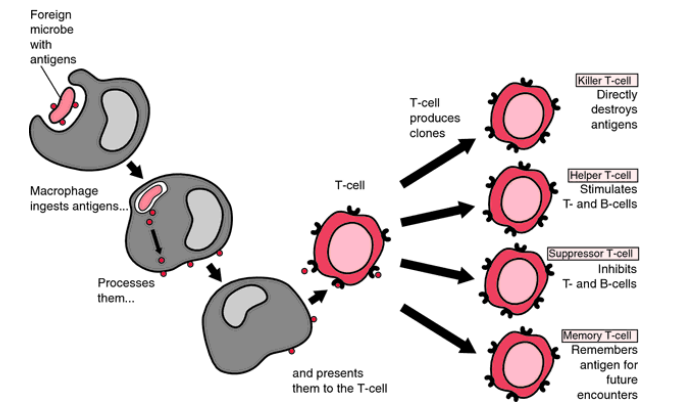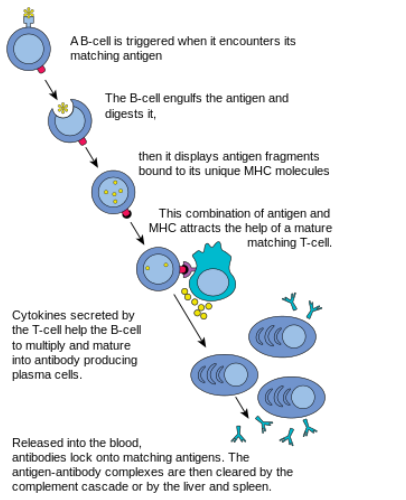Photo AI
Last Updated Sep 27, 2025
The Role of Antigen-Presenting Cells Simplified Revision Notes for A-Level AQA Biology
Revision notes with simplified explanations to understand The Role of Antigen-Presenting Cells quickly and effectively.
283+ students studying
2.5.5 The Role of Antigen-Presenting Cells
Antigen-presenting cells (APCs) play a crucial role in initiating and coordinating the immune response. They process and present antigens from pathogens or abnormal cells to T lymphocytes, enabling the immune system to recognise and respond to threats.
What Are Antigen-Presenting Cells (APCs)?
- Definition:
- APCs are specialised cells that process and display antigens on their surface bound to major histocompatibility complex (MHC) molecules.
- Examples of APCs:
- Macrophages: Engulf pathogens and present their antigens.
- Dendritic cells: Highly efficient APCs found in tissues that encounter external pathogens (e.g., skin, mucosa).
- B lymphocytes: Present antigens to helper T cells during the immune response.
Steps in Antigen Presentation:
- Pathogen Uptake:
- APCs engulf pathogens via phagocytosis or endocytosis.
- Antigen Processing:
- The pathogen is broken down into smaller fragments inside the APC.
- These fragments (antigens) are loaded onto MHC molecules within the cell.
- Antigen Presentation:
- The MHC-antigen complex is displayed on the surface of the APC.
- This allows the APC to interact with T lymphocytes, particularly helper T cells.
- T Cell Activation:
- T cells bind to the antigen-MHC complex via their T cell receptor (TCR).
- This activates the T cell, triggering the immune response.

Role of APCs in the Immune Response:
- Activation of T Cells:
- APCs present antigens to helper T cells, which release cytokines to activate other immune cells, including cytotoxic T cells and B cells.
- Coordination of Immune Response:
- APCs act as a link between the innate and adaptive immune systems, ensuring a targeted response.
- Triggering Immunological Memory:
- APCs help activate memory T cells, ensuring a faster response during subsequent infections.
Importance of Antigen Presentation:
- Non-Specific to Specific Response:
- APCs bridge the innate immune response (non-specific) and the adaptive immune response (specific).
- Targeted Defence:
- By presenting specific antigens, APCs enable the immune system to target pathogens effectively.
- Immunological Tolerance:
- APCs present self-antigens to prevent the immune system from attacking the body's own cells (in most cases).

Diseases Related to APC Dysfunction:
- Autoimmune Diseases:
- APCs presenting self-antigens may mistakenly activate T cells, causing the immune system to attack the body's tissues.
- Cancer:
- Cancer cells may evade immune detection by downregulating antigen presentation.
- HIV/AIDS:
- HIV targets helper T cells, impairing their interaction with APCs and weakening the immune system.
Tip for Exams:
- Understand the role of MHC molecules in antigen presentation and their interaction with T cells.
- Be able to describe the steps of antigen presentation and how it activates the adaptive immune response.
- Use examples like macrophages and dendritic cells to illustrate how APCs work.
Summary:
- Antigen-presenting cells (APCs) are essential for initiating the adaptive immune response.
- APCs process pathogens and present their antigens on MHC molecules, which activate T cells.
- By bridging the innate and adaptive immune systems, APCs ensure a specific, targeted defence against pathogens.
500K+ Students Use These Powerful Tools to Master The Role of Antigen-Presenting Cells For their A-Level Exams.
Enhance your understanding with flashcards, quizzes, and exams—designed to help you grasp key concepts, reinforce learning, and master any topic with confidence!
100 flashcards
Flashcards on The Role of Antigen-Presenting Cells
Revise key concepts with interactive flashcards.
Try Biology Flashcards10 quizzes
Quizzes on The Role of Antigen-Presenting Cells
Test your knowledge with fun and engaging quizzes.
Try Biology Quizzes9 questions
Exam questions on The Role of Antigen-Presenting Cells
Boost your confidence with real exam questions.
Try Biology Questions6 exams created
Exam Builder on The Role of Antigen-Presenting Cells
Create custom exams across topics for better practice!
Try Biology exam builder17 papers
Past Papers on The Role of Antigen-Presenting Cells
Practice past papers to reinforce exam experience.
Try Biology Past PapersOther Revision Notes related to The Role of Antigen-Presenting Cells you should explore
Discover More Revision Notes Related to The Role of Antigen-Presenting Cells to Deepen Your Understanding and Improve Your Mastery
96%
114 rated
Cell Recognition & the Immune System
The T Lymphocyte Response
425+ studying
190KViews